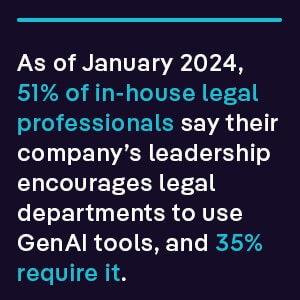 Artificial intelligence (AI) is transforming the way business is conducted across the globe. According to a 2023 Goldman Sachs report, two-thirds of U.S. occupations are exposed to some degree of automation by AI. And while it is often assumed that the legal industry lags when it comes to embracing technology, AI is making its mark there too. In fact, a recent study conducted by ContractPodAi found that as of January 2024, more than half of in-house legal professionals (51%) say their company’s leadership encourages legal departments to use GenAI tools, and more than a third (35%) require it.
The benefits of AI in the legal industry are vast. This article discusses how and why corporate legal departments are embracing AI in routine to complex legal matters to boost efficiency, enhance compliance, drive better decision-making and improve client service. It will share how artificial intelligence is empowering legal professionals to exceed the expectations of the modern legal landscape.
Artificial intelligence (AI) is transforming the way business is conducted across the globe. According to a 2023 Goldman Sachs report, two-thirds of U.S. occupations are exposed to some degree of automation by AI. And while it is often assumed that the legal industry lags when it comes to embracing technology, AI is making its mark there too. In fact, a recent study conducted by ContractPodAi found that as of January 2024, more than half of in-house legal professionals (51%) say their company’s leadership encourages legal departments to use GenAI tools, and more than a third (35%) require it.
The benefits of AI in the legal industry are vast. This article discusses how and why corporate legal departments are embracing AI in routine to complex legal matters to boost efficiency, enhance compliance, drive better decision-making and improve client service. It will share how artificial intelligence is empowering legal professionals to exceed the expectations of the modern legal landscape.
Artificial Intelligence in Corporate Legal Departments
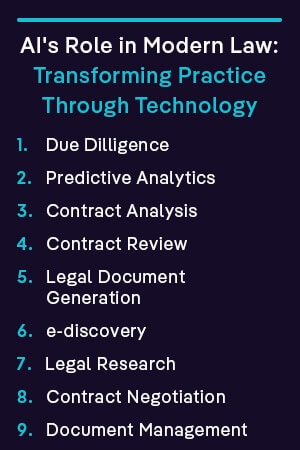 Like all aspects of an organization, legal departments feel the pressure to showcase proven value while controlling costs. As leading organizations endeavor to gain competitive advantage and increase productivity, adopting new legal technology assists in accomplishing both goals.
AI technology is changing the way legal services are provided by automating repetitive tasks, streamlining document management and location, processing a tremendous amount of information and refining contract review. AI computer software and systems are capable of more than just performing tasks according to fixed programming. Over time, modern AI systems improve their performance through human review and feedback, thus helping legal professionals make better, data-driven decisions. While AI will never replace human intelligence or human lawyers, it will continue to offer invaluable support and evolve the practices within a law firm or in-house counsel’s profession. AI tools are already being leveraged in several legal practices, including:
Like all aspects of an organization, legal departments feel the pressure to showcase proven value while controlling costs. As leading organizations endeavor to gain competitive advantage and increase productivity, adopting new legal technology assists in accomplishing both goals.
AI technology is changing the way legal services are provided by automating repetitive tasks, streamlining document management and location, processing a tremendous amount of information and refining contract review. AI computer software and systems are capable of more than just performing tasks according to fixed programming. Over time, modern AI systems improve their performance through human review and feedback, thus helping legal professionals make better, data-driven decisions. While AI will never replace human intelligence or human lawyers, it will continue to offer invaluable support and evolve the practices within a law firm or in-house counsel’s profession. AI tools are already being leveraged in several legal practices, including:
- Due Diligence
- Prediction Analytics
- Contract Analysis
- Contract Review
- Legal Document Generation
- e-discovery
- Legal Research
- Contract Negotiation
- Document management
The Benefits of AI in Law
Legal professionals say their teams have been proactive about issuing guidance on when, how, or if to use GenAI tools for legal work. A significant majority of respondents (85%) say their company’s legal department has established guidelines, best practices, or operating procedures for using GenAI tools.“36% of lawyers believe AI tools will be mainstream within the next five years.” — National Law Review
1. Streamlining Legal Processes
We all know that a lawyer’s time is valuable…and expensive. So, finding ways to save time in the legal industry, yet remain accurate and compliant, is critical – and benefits both the attorney and the client. Law practices and in-house counsel can analyze existing workflows to determine tasks that are time-consuming, often have human error, or can be streamlined through automation and introduce an AI solution to help. AI will assist with and accelerate critical parts of legal services, including comprehensive document review, exhausting proofreading and rigorous legal research. In turn, attorneys will have more time to focus on advising and counseling clients. Artificial intelligence tools assist with massive data sets (documents, etc) with high precision and simultaneously recognize patterns in the relationships between words or data to identify key information and find mistakes or inconsistencies. It can analyze contracts and other legal documents, find relevant information and complete these manual tasks instantly. Not only does this save time and diminish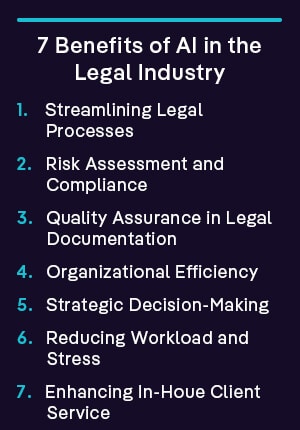 painstaking routine tasks, but it helps humans avoid error and burnout.
painstaking routine tasks, but it helps humans avoid error and burnout.
2. Risk Assessment and Compliance
Corporate governance is constantly changing, which can pose sophisticated legal and compliance complexities within an organization. AI systems have powerful functionality to help ensure compliance and identify legal risks by continuously monitoring regulatory changes and then associating them with any potential ramifications they could have on the business. These tools will alert the legal team when updates or changes occur, allowing legal professionals to stay proactive with compliance requirements and make necessary adjustments quickly. Similarly, artificial intelligence can analyze vast amounts of data (particularly useful in due diligence processes) and then can uncover potential risks and provide comprehensive guidance on how to prevent them, ultimately avoiding future havoc for the legal department and the law firm or company’s bottom line.3. Quality Assurance in Legal Documentation
Leveraging AI for Quality Assurance (QA) and legal reviews is becoming more and more necessary as it meticulously reads and summarizes relevant documents and then discloses any discrepancies or inaccurate data findings. It will locate specific clauses, potential risks or obligations associated with the company instantly – saving time, effort and energy. It also improves the comprehensiveness and accuracy of legal documents analysis, providing attorneys and legal professionals with rapid results and higher confidence in their work.4. Organizational Efficiency
AI is quickly becoming a necessary tool to stay competitive in today’s legal industry, especially when it comes to legal research, one of the most time-consuming tasks that legal professionals are forced to do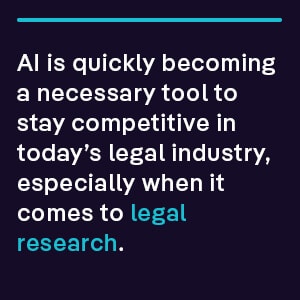 with nearly every case. Specialized vertical legal language models and AIs, like those used in ContractPodAi’s Leah software, excel when it comes to legal research and includes locating and analyzing pertinent information from numerous sources, including articles, statutes, relevant case law, and many more. AI assists lawyers by finding the authoritative sources and can even rank them by relevance. It can extract key information, provide a summary of each document, or compare the documents according to specified data. Lastly, AI can produce insights based on the information that will help legal professionals make better decisions.
with nearly every case. Specialized vertical legal language models and AIs, like those used in ContractPodAi’s Leah software, excel when it comes to legal research and includes locating and analyzing pertinent information from numerous sources, including articles, statutes, relevant case law, and many more. AI assists lawyers by finding the authoritative sources and can even rank them by relevance. It can extract key information, provide a summary of each document, or compare the documents according to specified data. Lastly, AI can produce insights based on the information that will help legal professionals make better decisions.
5. Strategic Decision-Making
Human judgment and human expertise will always be necessary in the area of legal practices. No matter how smart machine learning, AI algorithms and an AI tool is, the legal profession still relies on humans to uphold ethical standards, share valuable insights and perform strategic work. However, general counsels can leverage AI to practice law smarter as it reviews contracts and captures detailed data and trend analytics to help them make more-informed decisions. AI can examine past case laws and their outcomes to predict risk, compliance issues and future results of legal decisions. Using similar case law and having concrete data that highlights those outcomes, legal professionals can form new strategies or change existing strategies that will likely yield positive conclusions. AI can even assist in managing outside counsel by finding the best legal representation for a case based on previous legal matters conducted by a firm or individual. While human interaction is obviously necessary when making these decisions, artificial intelligence saves time and costs by completing the upfront grunt work and creates a shortlist of highly-qualified candidates.6. Reducing Workload and Stress
AI not only alleviates redundant, time-consuming in-house staff workload, it ultimately plays a role in creating higher job satisfaction, reducing attorney stress and minimizing work frustration. By allowing AI to perform administrative tasks and offer support in drafting, document analysis, and more, a legal professional can focus their time on higher-value, strategic duties that utilize their trained legal expertise. And knowing they can harness the power of AI’s findings yields greater confidence in their own performance and work on legal matters. It also enables legal teams to increase their productivity, which removes the stressful burden of meeting difficult deadlines.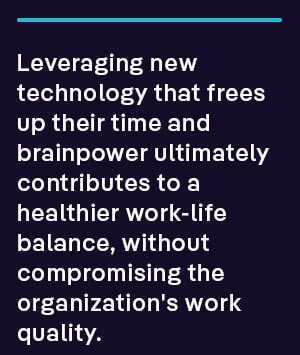 AI technology in the legal field automates many of the repetitive duties the keep attorneys at the office until late in the night, creating all-too-common burnout. Leveraging new technology that frees up their time and brainpower ultimately contributes to a healthier work-life balance, without compromising the organization’s work quality. Improving and recognizing the importance of a lawyer’s mental health means organizations are able to retain talent longer, resulting in a better culture overall.
AI technology in the legal field automates many of the repetitive duties the keep attorneys at the office until late in the night, creating all-too-common burnout. Leveraging new technology that frees up their time and brainpower ultimately contributes to a healthier work-life balance, without compromising the organization’s work quality. Improving and recognizing the importance of a lawyer’s mental health means organizations are able to retain talent longer, resulting in a better culture overall.
7. Enhancing In-House Client Service
When legal professionals are forced to focus their time staring at endless documents and data, client phone calls go unanswered, emails get ignored and clients are left feeling unimportant. AI enables in-house lawyers to focus more on strategic legal advising and less on mundane tasks, which improve service for internal and external clients. Less time spent on low-level, monotonous responsibilities means attorneys have time and opportunity to engage more in human-specific activities, such as improving client response times, more consistent, personalized client communication, strategic brainstorming with peers and building trust. AI also equips legal teams with better information and legal research, helping build better cases, yielding positive results, and ultimately makes their clients happy. Frequent communication, proven data, more accurate work, better results and improved relationships is a win/win for all parties.Conclusion
As corporate legal teams navigate AI in the workplace, they will continue to discover all of the powerful ways it can assist them with both daily and long-term tasks. From drastically improving efficiencies, mitigating risk and ensuring compliance to reducing stress and driving better client service, AI in the legal world is not only here to stay, it is only bound to make its presence more known. In fact, Mordor Intelligence found that the AI Software Market In Legal Industry is expected to grow from USD 2.19 billion in 2024 to USD 3.64 billion by 2029.
The integration of AI across the legal profession – research, analytics, due diligence, compliance, contract management, and more – is having a remarkable impact inside corporate legal departments. Will AI replace lawyers? No. Instead it empowers them to do their job better, faster and smarter. And the emergence of AI systems puts legal departments in a prime position to drive profitability, decrease costs and enhance productivity like never before.
ways it can assist them with both daily and long-term tasks. From drastically improving efficiencies, mitigating risk and ensuring compliance to reducing stress and driving better client service, AI in the legal world is not only here to stay, it is only bound to make its presence more known. In fact, Mordor Intelligence found that the AI Software Market In Legal Industry is expected to grow from USD 2.19 billion in 2024 to USD 3.64 billion by 2029.
The integration of AI across the legal profession – research, analytics, due diligence, compliance, contract management, and more – is having a remarkable impact inside corporate legal departments. Will AI replace lawyers? No. Instead it empowers them to do their job better, faster and smarter. And the emergence of AI systems puts legal departments in a prime position to drive profitability, decrease costs and enhance productivity like never before. Unlock the Future of Legal with GenAI
Discover how Artificial Intelligence can transform your legal team's efficiency and productivity. Get actionable insights, strategic tips, and a framework for implementing GenAl in your legal workflows with our comprehensive guide.
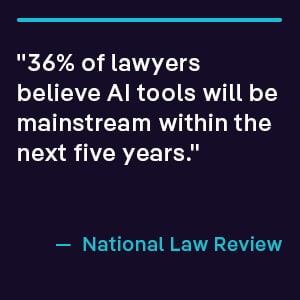 “36% of lawyers believe AI tools will be mainstream within the next five years.” —
“36% of lawyers believe AI tools will be mainstream within the next five years.” — 

